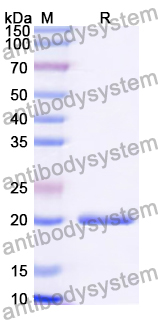Catalog No.
YHA13001
Expression system
E. coli
Species
Homo sapiens (Human)
Protein length
Glu9-Asp161
Predicted molecular weight
20.12 kDa
Nature
Recombinant
Endotoxin level
Please contact with the lab for this information.
Purity
>90% as determined by SDS-PAGE.
Accession
O00471
Applications
ELISA, Immunogen, SDS-PAGE, WB, Bioactivity testing in progress
Form
Lyophilized
Storage buffer
Lyophilized from a solution in PBS pH 7.4, 0.02% NLS, 1mM EDTA, 4% Trehalose, 1% Mannitol.
Reconstitution
Reconstitute in sterile water for a stock solution. A copy of datasheet will be provided with the products, please refer to it for details.
Shipping
In general, proteins are provided as lyophilized powder/frozen liquid. They are shipped out with dry ice/blue ice unless customers require otherwise.
Stability and Storage
Use a manual defrost freezer and avoid repeated freeze thaw cycles. Store at 2 to 8°C for frequent use. Store at -20 to -80°C for twelve months from the date of receipt.
Alternative Names
Exocyst complex component 5, Exocyst complex component Sec10, hSec10, EXOC5, SEC10, SEC10L1
Oocyte-specific EXOC5 expression is required for mouse oogenesis and folliculogenesis., PMID:39037927
Cilia-deficient renal tubule cells are primed for injury with mitochondrial defects and aberrant tryptophan metabolism., PMID:38721661
High water intake induces primary cilium elongation in renal tubular cells., PMID:37933114
circEXOC5 promotes acute lung injury through the PTBP1/Skp2/Runx2 axis to activate autophagy., PMID:36302650
Exocyst inactivation in urothelial cells disrupts autophagy and activates non-canonical NF-κB signaling., PMID:36004645
Hydrogen sulfide, a gaseous signaling molecule, elongates primary cilia on kidney tubular epithelial cells by activating extracellular signal-regulated kinase., PMID:34697270
Conditional Loss of the Exocyst Component Exoc5 in Retinal Pigment Epithelium (RPE) Results in RPE Dysfunction, Photoreceptor Cell Degeneration, and Decreased Visual Function., PMID:34064901
Disrupted glucose homeostasis and skeletal-muscle-specific glucose uptake in an exocyst knockout mouse model., PMID:33647317
Exocyst components promote an incompatible interaction between Glycine max (soybean) and Heterodera glycines (the soybean cyst nematode)., PMID:32929168
Weighted burden analysis of exome-sequenced late-onset Alzheimer's cases and controls provides further evidence for a role for PSEN1 and suggests involvement of the PI3K/Akt/GSK-3β and WNT signalling pathways., PMID:32020597
Primary cilia and the exocyst are linked to urinary extracellular vesicle production and content., PMID:31694916
The exocyst complex regulates insulin-stimulated glucose uptake of skeletal muscle cells., PMID:31593505
Defects in the Exocyst-Cilia Machinery Cause Bicuspid Aortic Valve Disease and Aortic Stenosis., PMID:31387361
The role of the exocyst in renal ciliogenesis, cystogenesis, tubulogenesis, and development., PMID:31284362
The exocyst functions in niche cells to promote germline stem cell differentiation by directly controlling EGFR membrane trafficking., PMID:31142545
Disruption of the exocyst induces podocyte loss and dysfunction., PMID:31073028
The exocyst acting through the primary cilium is necessary for renal ciliogenesis, cystogenesis, and tubulogenesis., PMID:30824539
Exocyst Complex Member EXOC5 Is Required for Survival of Hair Cells and Spiral Ganglion Neurons and Maintenance of Hearing., PMID:29327200
Downregulation of exocyst Sec10 accelerates kidney tubule cell recovery through enhanced cell migration., PMID:29326040
The exocyst is required for photoreceptor ciliogenesis and retinal development., PMID:28729419
Crystal structure of Sec10, a subunit of the exocyst complex., PMID:28098232
Sec8 modulates TGF-β induced EMT by controlling N-cadherin via regulation of Smad3/4., PMID:27769780
Unilateral nephrectomy elongates primary cilia in the remaining kidney via reactive oxygen species., PMID:26923764
Urothelial Defects from Targeted Inactivation of Exocyst Sec10 in Mice Cause Ureteropelvic Junction Obstructions., PMID:26046524
The exocyst gene Sec10 regulates renal epithelial monolayer homeostasis and apoptotic sensitivity., PMID:26040895
Exocyst Sec10 protects renal tubule cells from injury by EGFR/MAPK activation and effects on endocytosis., PMID:25298525
Cdc42 deficiency causes ciliary abnormalities and cystic kidneys., PMID:23766535
Exocyst Sec10 is involved in basolateral protein translation and translocation in the endoplasmic reticulum., PMID:23037926
Early to intermediate steps of tumor embolic formation involve specific proteolytic processing of E-cadherin regulated by Rab7., PMID:22638108
The small GTPase Cdc42 is necessary for primary ciliogenesis in renal tubular epithelial cells., PMID:21543338
The exocyst protein Sec10 interacts with Polycystin-2 and knockdown causes PKD-phenotypes., PMID:21490950
E-cadherin accumulation within the lymphovascular embolus of inflammatory breast cancer is due to altered trafficking., PMID:21036701
Exocyst Sec10 protects epithelial barrier integrity and enhances recovery following oxidative stress, by activation of the MAPK pathway., PMID:20053792
The exocyst protein Sec10 is necessary for primary ciliogenesis and cystogenesis in vitro., PMID:19297529
The exocyst affects protein synthesis by acting on the translocation machinery of the endoplasmic reticulum., PMID:12665531
Exocyst is involved in cystogenesis and tubulogenesis and acts by modulating synthesis and delivery of basolateral plasma membrane and secretory proteins., PMID:11102522

